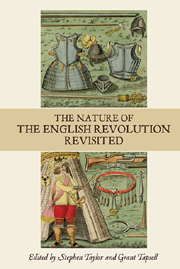Book contents
- Frontmatter
- Contents
- Preface and Acknowledgements
- List of contributors
- List of Abbreviations
- 1 Charles I and Public Opinion on the Eve of the English Civil War
- 2 Rethinking Moderation in the English Revolution: The Case of An Apologeticall Narration
- 3 The Parish and the Poor in the English Revolution
- 4 Body Politics in the English Revolution
- 5 The franchise Debate Revisited: The Levellers and the Army
- 6 Oliver Cromwell and the Instrument of government
- 7 ‘de te fabula narratur’: The Narrative Constitutionalism of James Harrington's Oceana
- 8 Democracy in 1659: Harrington and the Good Old Cause
- 9 The Restoration of the Church of England, 1660–1662: Ordination, Re-ordination and Conformity
- 10 Style, Wit and Religion in Restoration England
- 11 A British Patriarchy? Ecclesiastical Imperialism under the Later Stuarts
- Index
- Studies in Early Modern Cultural, Political and Social History
6 - Oliver Cromwell and the Instrument of government
Published online by Cambridge University Press: 05 July 2013
- Frontmatter
- Contents
- Preface and Acknowledgements
- List of contributors
- List of Abbreviations
- 1 Charles I and Public Opinion on the Eve of the English Civil War
- 2 Rethinking Moderation in the English Revolution: The Case of An Apologeticall Narration
- 3 The Parish and the Poor in the English Revolution
- 4 Body Politics in the English Revolution
- 5 The franchise Debate Revisited: The Levellers and the Army
- 6 Oliver Cromwell and the Instrument of government
- 7 ‘de te fabula narratur’: The Narrative Constitutionalism of James Harrington's Oceana
- 8 Democracy in 1659: Harrington and the Good Old Cause
- 9 The Restoration of the Church of England, 1660–1662: Ordination, Re-ordination and Conformity
- 10 Style, Wit and Religion in Restoration England
- 11 A British Patriarchy? Ecclesiastical Imperialism under the Later Stuarts
- Index
- Studies in Early Modern Cultural, Political and Social History
Summary
The Instrument of Government, the document which ratified the elevation of Oliver Cromwell to the office of lord protector on 16 December 1653, has a distinctive place in English political history. It was the nation's first written constitution. Except for the Humble Petition and Advice, which replaced it in 1657, it has been the only one. Perhaps the term ‘written constitution’, which might have been barely intelligible at the time, will seem too grand for either text, at least if it suggests either a start from scratch or a guarantee of static or permanent arrangements. Both documents took for granted the survival of some familiar constitutional practices. Neither of them questioned the supremacy of parliamentary statute or its capacity to amend the new arrangements. Nonetheless the Instrument's provision for the conduct of government by a single set of rules and procedures, laid down at a single time, was a bold conception. The document drew on two sets of constitutional proposals that had been formulated by the New Model Army in the later 1640s: the Heads of Proposals of 1647 and the Agreement of the People of January 1649. But whereas those texts had been drawn up for submission to parliament, the Instrument was a decree. Audaciously it was imposed not on one nation but on three, even though many of its provisions were irrelevant or ill-suited to the conditions of recently conquered Scotland and Ireland.
- Type
- Chapter
- Information
- The Nature of the English Revolution Revisited , pp. 123 - 150Publisher: Boydell & BrewerPrint publication year: 2013



